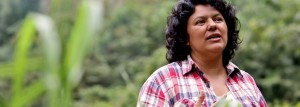Paris-Geneva, March 3, 2016 – The Observatory for the Protection of Human Rights, a joint FIDH-OMCT program, strongly condemns the murder of Ms Berta Cáceres, Leader of the Lenca indigenous community. This murder demonstrates the reluctance of the Honduran authorities to ensure the protection of human rights defenders.
Human rights defender Gustavo Castro Soto, member of the organisation Other Worlds of Chiapas, and of the Mexican Movement of People Affected by Dams and in Defense of Rivers (MAPDER) in Mexico, as well as of the Mesoamerican Movement against the M4 Mining Model and the Latin American Network against Dams and for Rivers, their Communities and Water (REDLAR), who was present in the country as part of an exchange of experiences with COPINH on energy alternatives according to indigenous vision, was also injured during the attack.
Ms. Berta Cáceres fought for the rights of the Lenca indigenous people, notably the right to recover their land in Rio Blanco (the White River) in Intibucá, and against the construction of the hydroelectric dam Agua Zarca by the Energy Development Company S.A. (DESA), on Lenca territory. The Lenca people have long been struggling for the defense of their ancestral lands and for the protection of the White River. As a result, the Lenca population has been persecuted some were forced to abandon their territories. Some members of the community were injured, and in 2014, four Lencas were killed. These attacks were perpetrated in total impunity.
On several occasions, Ms. Cáceres denounced the expropriation of the Lenca from their ancestral territories and the lack of protection in terms of health and agricultural . Additionally, she opposed the establishment of US military bases in Lenca territory. Last week, she participated in a press conference and denounced the murder of four leaders of her community and the threats made against other Lencas. Recently, Ms. Cáceres was awarded the Goldman Prize 2015 for Latin America because of her continuous commitment and work in favor of human rights.
The Observatory notes with concern and strongly denounces the increasing attacks and the criminalisation of individuals and communities who engage in the defense of human rights, including land rights, in the context of investment projects (hydroelectric, mining, mono-culture, etc.) in Honduras, as a form of intimidation to their work. This trend is addressed in the Observatory Report entitled “Criminalisation of human rights defenders in the context of industrial projects: a regional phenomenon in Latin America” (available in Spanish), in which the harassment faced by Ms. Cáceres was analysed.
The Observatory also denounces the Honduran authorities’ lack of will to implement and enforce the protection measures for human rights defenders. Ms. Berta Cáceres was benefiting from precautionary measures granted by the Inter-American Commission on Human Rights since June 29, 2009.
In this context, the Observatory urges the authorities of Honduras to respect the work of human rights defenders and to take seriously and responsibly their obligation to ensure that urgent protection measures are effectively implemented and benefit from an adequate budget.
Finally, the Observatory urges the Honduran authorities to carry out an immediate, thorough, impartial and international investigation into all attacks against defenders, and that all those responsible are brought to justice.
The Observatory for the Protection of Human Rights Defenders (OBS) was created in 1997 by FIDH and the World Organisation Against Torture (OMCT). The objective of this programme is to intervene to prevent or remedy to situations of repression against human rights defenders.


